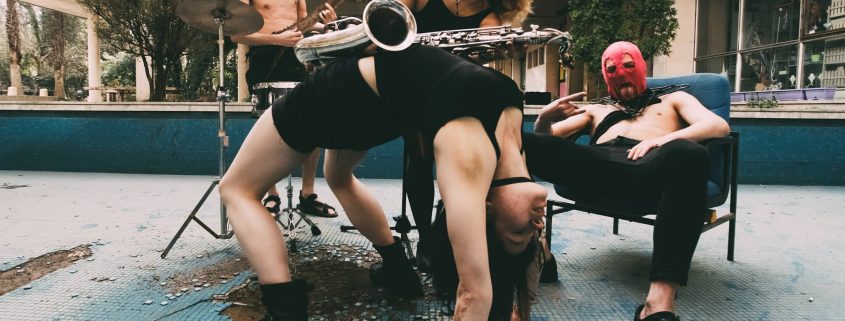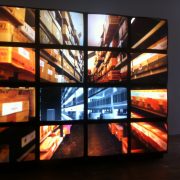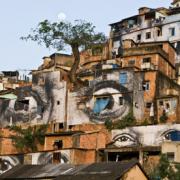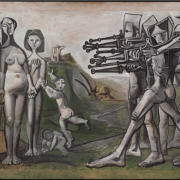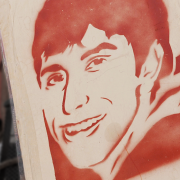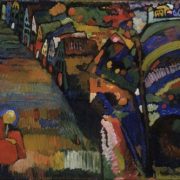Everyone can be a Pussy Riot (Art and Resistance – Chapter 1)
By Manon Beury
“I cannot attend the Pussy Riot’s performance tonight. Do you want my ticket?”
It is a beautiful gift that Fiana, founder of Creating Rights, offered me this Thursday morning. On January 31st, 2019, we waited for the show to start at 20:30 at Paard in The Hague. I didn’t know what to expect from what the venue’s website described as “a theatre project” by the Pussy Riot Theatre “with fevered monologues underpinned by real footage and frenetic noise-punk.” Little did I know that every single minute of Riot Days would resonate with Creating Rights’ focus on human rights, justice and art. My expectation, however, was that this opportunity would be a great starting point for a project that I had in mind: exploring the multifaceted interplay between art and resistance.
The Russian feminist art collective Pussy Riot was created in 2011 with the explicit goal of conducting guerrilla action through art performance. The link between art and resistance cannot be clearer. One year later, international attention turned to Russia when three members of the Pussy Riot, including co-founder Maria (Masha) Alyokhina, were sentenced to two years in prison following a performance in Moscow’s Cathedral of Christ the Saviour. Smuggling a guitar and an amplifier into the church, their face covered with coloured knitted balaclavas that will soon become internationally famous, they performed a “Punk Prayer” at the altar to protest against the Orthodox Church’s support for Putin’s election campaign.
Based on Maria Alyokhina’s newly published book of the same name, the performance Riot Days relates the story of this protest, her subsequent arrest and incarceration. It is not theatre nor a concert or a mix of both. Alyokhina herself is on stage, accompanied by Kiryl Masheka, Diana Burkot, and Oleg Larionov. On minimalist electronics, they rattle off a long monologue in Russian, only interspersed with jazzy saxophone, hysterical drums solos and some of Pussy Riot’s songs. The text is a mix of Alyokhina’s poetic memoir, quotes that influenced her, dissenting political statements and excerpts from the trial transcripts. Each word is translated on a gigantic screen behind the stage, where documentary footage frantically unfurls and political slogans in bold white letters on black screen flash from the screen as they sing or shout in unison. It is punk, wild and yet perfectly synchronized. The outburst of audio-visual effects makes it impossible to read the subtitles, watch the video and enjoy the show all at once, especially when you cannot stop dancing. As a result, I wanted to watch the performance again at the minute it was over. Or read the book.
“MOTHER MARY, BE A FEMINIST!”
The performance starts with a powerful prayer chant in an atmosphere charged with defiant reverence. While the screen shows footage of the preparation of the Punk Prayer in February 2012, the audience dives into the young band’s excitement and Alyokhina’s self-doubts: “Do I have the right to do this or am I a barbarian?” All along the show, she will interrogate what is right, just or fair.
“SECURITY TOOK KATYA’S GUITAR AFTER 40 SECONDS. 40 SECONDS OF CRIME.”
The pace of the song raises relentlessly as we follow the band in hiding throughout Moscow. With humour, the performers enumerate golden rules to escape the police: “We ate whatever God sent our way, which was usually pasta.” Fragmented images of the band running through metro stations and Alyokhina giving interviews to foreign journalists from the bathrooms of a café. Smiles on the audience’s face swiftly fade when the image of a police van appears on screen. In March 2012, Alyokhina, Nadezhda (Nadya) Tolokonnikova and Yekaterina (Katya) Samutsevich were arrested and charged with “disorderly conduct, committed with the purpose of inciting religious hatred by a group of persons in an intentional conspiracy”. Restless, wearing their balaclavas and panda masks, the performers recount the trial, mistreatment by the police and the sentence of two years in prison in August 2012. Dropping her mask, protected by a black hood, Alyokhina stands at the centre of the stage to tell the story of her incarceration and solitary confinement in a Siberian penal colony: “the republic of convicts” in the Ural mountains.
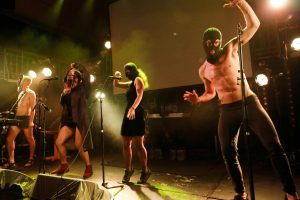
Pussy Riot on stage at Summerhall, Edinburgh, with Maria ‘Masha’ Alyokhina, centre, in balaclava. Photograph: Katherine Anne Rose for the Observer The Guardian, 19 August 2018
“THIS IS WHAT PROTEST SHOULD BE: DESPERATE, SUDDEN AND JOYOUS.”
The darkest moment of the performance is suddenly disrupted when Kiryl Masheka starts throwing countless bottles of water to the crowd. Standing close to the stage, I am soaked but grateful as the audience around me finally begins to dance and respond to what happens on stage. Defiance takes over the gloom when the performers strip their hoodies and light their cigarettes on stage before engaging in a frenetic dance on ravey techno music. Alyokhina explains what life looks like in today’s Russian gulags: tales of human rights abuses, protests and hunger strikes, inmates’ solidarity and romantic love between women.
“CREATE REALITY.”
Having served 21 months in prison, Tolokonnikova and Alyokhina were released in December 2013 following an amnesty approved by the Russian Parliament. Riot Days ends with the pictures of political activists who remain imprisoned. In the venue’s hall, the collective sells t-shirt proclaiming that “Everyone can be a Pussy Riot”, destined to finance the lawyers’ fees of those in the penal colonies. Art financing justice and resistance.

